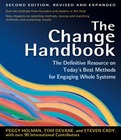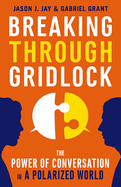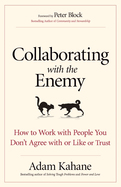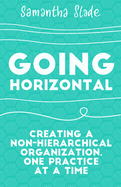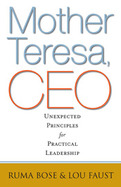2007
- Features descriptions of sixty-one change methods--up from eighteen in the first edition--and new chapters on selecting a method, mixing and matching methods, and sustaining results
- Describes every change method's essential concepts and processes and provides advice on when to use each
- Including ninety contributors, with many of the originators of the change methods described
These conversations are vital, but too often get stuck. They become contentious or we avoid them because we fear they might. What if, in these difficult conversations, we could stay true to ourselves while enriching relationships and creating powerful pathways forward? What if our divergent values provided healthy fuel for dialogue and innovation instead of gridlock and polarization? Jason Jay and Gabriel Grant invite us into a spirit of serious play, laughing at ourselves while moving from self-reflection to action. Using enlightening exercises and rich examples, Breaking through Gridlock helps us become aware of the role we unwittingly play in getting conversations stuck. It empowers us to share what really matters – with anyone, anywhere – so that together we can create positive change in our families, organizations, communities, and society.
Often, to get something done that really matters to us, we need to work with people we don't agree with or like or trust. Adam Kahane has faced this challenge many times, working on big issues like democracy and jobs and climate change and on everyday issues in organizations and families. He has learned that our conventional understanding of collaboration—that it requires a harmonious team that agrees on where it's going, how it's going to get there, and who needs to do what—is wrong. Instead, we need a new approach to collaboration that embraces discord, experimentation, and genuine cocreation—which is exactly what Kahane provides in this groundbreaking and timely book.
2018
In this book, self-management expert Samantha Slade presents seven concrete practices to help your organization flatten its existing hierarchy and develop a horizontal organization. The result will be enhanced creativity, greater growth, and a increased employee retention and productivity—and a better bottom line.
These days, more than ever, successful organizations must respond quickly and nimbly to change—they need every employee's best thinking. A horizontal organization creates an environment of true collaboration, respect, and openness. It allows everyone more freedom to express unconventional ideas or to work through issues that are getting in the way of organizational goals. And it's a more human way to organize—after all, we function perfectly well in our day-to day lives without someone telling us what to do.
But when an organization decides to go horizontal, it can be overwhelming for both managers and employees. Slade offers a practical, proven, incremental method to help organizations of all kinds and sizes ease in to a non-hierarchical model. She includes techniques for using your organization's purpose to stay focused and aligned, developing shared decision-making, creating a mutual feedback culture, nurturing autonomy, holding co-managed meetings, and maintaining an environment of collective learning.
Going Horizontal will help organizations become more adaptive, collaborative and innovative, which is vital in today's highly competitive and constantly-evolving world.
America faces huge challenges—climate change, social injustice, racist violence, economic insecurity. Journalist Sarah van Gelder suspected that there were solutions, and she went looking for them, not in the centers of power, where people are richly rewarded for their allegiance to the status quo, but off the beaten track, in rural communities, small towns, and neglected urban neighborhoods.
She bought a used pickup truck and camper and set off on a 12,000-mile journey through eighteen states, dozens of cities and towns, and five Indian reservations. From the ranches of Montana to the coalfields of Kentucky to the urban cores of Chicago and Detroit, van Gelder discovered people and communities who are remaking America from the ground up. Join her as she meets the quirky and the committed, the local heroes and the healers who, under the mass media's radar, are getting stuff done. The common thread running through their work was best summed up by a phrase she saw on a mural in Newark: “We the People LOVE This Place.” That connection we each have to our physical and ecological place, and to our human community, is where we find our power and our best hopes for a new America.
2011
Offers ten suprising leadership lessons and shows how they can improve snd enrich any leader or organization.
-
The first book to portray Mother Teresa as the realistic, pragmatic leader of one of the world's most recognized and successful global organizations
-
Offers eight surprising leadership lessons and shows how they can improve and enrich any leader or organization
-
Draws on coauthor Ruma Bose's firsthand experiences working with Mother Teresa
When most people think of Mother Teresa, they think of a saint--a spiritual hero of extraordinary humanitarian accomplishments, a Nobel Peace Prize winner. But Mother Teresa was also the leader of one of the world's largest and most successful organizations: the Missionaries of Charity. Since founding it in 1948 she has raised billions of dollars, and with over a million volunteers in more than 100 countries, it remains one of the most recognized brands in the world. How did one nun who never received any formal education in business build such an impressive global organization?
Frank, realistic, and firmly grounded in practicality, Mother Teresa's leadership style helped to inspire and organize people across the world. This book shares eight essential leadership principles drawn from Mother Teresa's example and applies them to today's business world. Authors Ruma Bose, an entrepreneur who volunteered with Mother Teresa, and Lou Faust, a leading business expert, are the first to examine her in this light--as a leader whose management style and dedication to a singular vision led to one of the world's most unlikely success stories.
Mother Teresa may have been a saint, but her spectacular success was not a product of divine providence. Her genius was the simplicity of her vision and her dedication to its implementation. It was in the way she treated her people, refusing to distance herself from the everyday work of a typical sister of the Missionaries of Charity. It was in how she handled tough choices--like accepting donations from brutal Haitian dictator Francois "Papa Doc" Duvalier. These were the principles that made her the great leader of a global organization, and they can be applied by anyone in any organization--no sainthood required.


